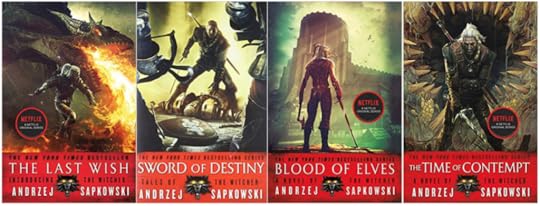Adrian Collins's Blog, page 226
January 15, 2020
Vampire the Masquerade 5th Edition: An interview with Matthew Dawkins
Today we have a special guest with Vampire: The Masquerade line developer Matthew Dawkins. Matthew Dawkins is a prolific game writer as well as producer of content with work across multiple game lines including his own, They Came from Beneath the Sea, which is a humorous spoof of 1950s Red Scare tropes and b-movie science fiction.
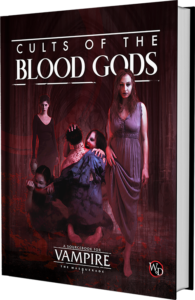 Readers of Grimdark Magazine know how big a fan I am of the 5th Edition of Vampire: The Masquerade released last year. I feel like it’s a wonderful return to the roots of the game with a re-focus on horror, Humanity, and struggles with the Beast. It’s also directly targeted at adult audiences.
Readers of Grimdark Magazine know how big a fan I am of the 5th Edition of Vampire: The Masquerade released last year. I feel like it’s a wonderful return to the roots of the game with a re-focus on horror, Humanity, and struggles with the Beast. It’s also directly targeted at adult audiences.
Recently, they have launched a Kickstarter for a new supplement called Cults of the Blood Gods, which is about vampire faiths. Like the undead themselves, they are bloody, atavistic, and frequently alien in their morality. Perfect for grimdark fans and a great thing to back this Christmas (or January).
1. Is Vampire: The Masquerade still wandering the nights of the new millennium?
It absolutely is. Ever since Vampire: The Masquerade 20th Anniversary Edition, interest in Vampire has been going up and up. The fifth edition of the game was released in 2018, and since then we’ve seen a book for the Camarilla, the Anarchs, and Chicago by Night.
2. What books will you need to have to really get your money’s worth from Cults of the Blood Gods?
You’ll only need the core book, but I recommend the Anarch book if you want to get a lot out of the Church of Set, or Chicago by Night if you want more insight into the nihilistic Cult of Shalim’s activities.
3. What can you tell us about the supplement itself?
Cults of the Blood Gods covers the myriad of vampire religions that exist in the World of Darkness. Worship of law, chaos, and everything in between, whether in search of enlightenment, gifts from a godlike master, or the chance to redeem oneself from the curse of being a vampire. It contains the Clan of Death – the necromancers such as the Giovanni and Cappadocians, who raise zombies and talk to the dead – and has a full playable story in there with characters you can play right out of the book.
4. Will fans of the Giovanni Clan like the changes you make?
I certainly hope so! The strongest element behind the Giovanni is the family structure, and the Hecata really play on that. The Hecata are an evolution of the Giovanni, taking in all the other clans and lines of death to create a functioning but highly dysfunctional, abusive, and incestuous family of necromancers.
5. What sort of rules material are here?
This book contains a plethora of new powers for vampires of many cults and faiths, from the Church of Caine being able to manipulate fire, to the Bahari being able to twist the earth to their will. The Church of Set can now remove their own hearts for safekeeping, while the Hecata have a bevy of necromantic powers at their disposal.
6. What sort of gains do Backers get for backing the project vs. buying later?
They can read the manuscript already! Just by backing you can gain access to the entire book before it’s released. Also, by backing the Kickstarter you help fund and gain access to further sourcebooks other fans will be paying for separately, such as the Trail of Ash and Bone.
7. Is Kickstarter the way of the future for tabletop games?
Different companies have different preferences, but all my uses of Kickstarter have been highly positive. Fans love an interactive way of backing their game and engaging with the creators, and Kickstarter campaigns enable and encourage that.
8. Do you have any favorite parts from Cults of the Blood Gods?
I love the entire book, but my favorite parts must be the chapters titled The Cult of Death and Undeath, and the Hecata. I love some dark arts in my games, and this twisted group of death-dealers is up there as my favorite playable clan. Who doesn’t like a necromancer or lich in their game?
9. Will any old favorites show up in the book?
Long-term fans of the game will recognize some character names and clan powers from previous editions, but likewise, there’s lots of new material in here too for those same established fans. I think there’s something for everyone in Cults of the Blood Gods.
10. What other products does Onyx Path have coming up that you’ll be involved in?
Everyone should check out They Came from Beneath the Sea! before the pre-order window on Backerkit.com closes, and it’s closing very soon! If you like your horror and science fiction to have a 1950s, cold war feel, please check it out! It’s a game that can be played with humor or Lovecraftian seriousness, and has had a fantastic reception to date.
CLICK ON THE BANNER BELOW TO BACK VAMPIRE THE MASQUERADE 5th EDITION ON KICKSTARTER
The post Vampire the Masquerade 5th Edition: An interview with Matthew Dawkins appeared first on Grimdark Magazine.
January 13, 2020
REVIEW: The Light of All That Falls by James Islington
I have been looking forward to reading The Light of All That Falls ever since I finished An Echo of Things To Come and have been counting down the days until I could return to the world of Davian, Caeden, Asha and Wirr. I won’t go into too much detail here regarding the actual story as I don’t wish to spoil anything for people who haven’t started the series yet.
“Remember that your past does not define you—no matter the consequences,” he said gently. “Choice is meaningless without consequences, and a privilege we do not deserve if we will not face them. You are facing them, Tal’kamar. You have changed.”
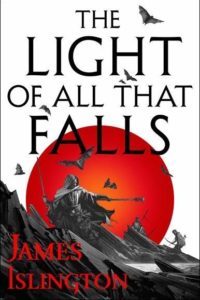 I can safely say that the final entry in The Licanius Trilogy is breathtaking and brimming with phenomenal moments throughout. It starts off with a showdown in the prologue and wraps up with one of the finest and perfectly crafted endings that I have read in a long while. One I did not see coming at all but is satisfying and wraps all the loose ends up expertly. There are quieter segments in the beginning-middle stages. All four of the point of view perspectives had a huge number of highlights and they intertwine and occasionally cross paths. It’s always excellent when the main characters meet up again. Some of these engagements take place unexpectedly and not until much later in this eight-hundred-page door-stopper.
I can safely say that the final entry in The Licanius Trilogy is breathtaking and brimming with phenomenal moments throughout. It starts off with a showdown in the prologue and wraps up with one of the finest and perfectly crafted endings that I have read in a long while. One I did not see coming at all but is satisfying and wraps all the loose ends up expertly. There are quieter segments in the beginning-middle stages. All four of the point of view perspectives had a huge number of highlights and they intertwine and occasionally cross paths. It’s always excellent when the main characters meet up again. Some of these engagements take place unexpectedly and not until much later in this eight-hundred-page door-stopper.
As mentioned, it had been some time since I finished the last book and I thought it was a nice addition offered by Islington that he presents a summary of past events at the start of The Light of All That Falls. This usefully filled in the slight gaps in my knowledge and potential confusion with character names. Caeden and Davian have always been the characters I have enjoyed following the most especially with their destinies been so closely intertwined.
I believe only two years have passed since we met the ensemble for the first time in The Shadow of What Was Lost. The characters have changed so much and you wouldn’t really recognise the same three students who met at the school for the Gifted. A few of the players are extremely overpowered now – both main and supporting. In addition the magic-schemes and possibilities get much deeper, complex and enhanced throughout the overall narrative. The magic system is one of my favourites from modern fantasy although it’s sometimes confusing and scientific-like within the rules of the crafted world.
Elements included are destiny, knowing your fate, time-travel, a legendary sword, and alternate plains of existence where time doesn’t follow normal rules. It has incredibly well-depicted monstrosities such as the serpent-like Dar’Gaithin and the terrifying Al’Goriat. These often cause havoc and raise a great deal of suspense. It includes a plethora of competing factions, complex and sometimes frosty relationships, and thousands of years of past history. The trilogy also showcases a huge dramatis personae and a unique and detailed glossary of world-specific phrases. This is a useful link regarding the points mentioned above: (here) A version is also included and updated in the novel itself.
There isn’t really much left to say regarding my feelings with this trilogy and the final entry in this series that I haven’t mentioned already. It was an epic, stunning and extremely satisfying finale. The series features some of my favourite modern fantasy characters that I truly cared about and ended up loving. It’s one of my favourite trilogies from the last 5 years and the ending was perfect and completely unpredictable. It is the end of an era and I’m not sure if we will return to see these characters again. Islington does hint in his afterwards that we may return to the world and see the stories of more minor but extremely important players. I can’t wait.
Buy The Light of all that Falls
The post REVIEW: The Light of All That Falls by James Islington appeared first on Grimdark Magazine.
January 10, 2020
Netflix’s The Witcher: The books vs the show
Like many individuals, I was introduced to The Witcher by the CD Projekt Red video games that showed a dark, sensual, cynical, and sometimes humorous world I hadn’t yet encountered in fantasy. Before Joe Abercrombie or even George R.R. Martin, Andrzej Sapkowski created a multi-book epic that incorporated elements from Polish folklore, Spaghetti Westerns, and his own life experiences that was already a nationally popular series in his homeland before it exploded onto the world stage with his adaptations. While CD Projekt Red and Sapkowski have since reconciled after a nasty legal dispute over royalties, the Netflix series is an adaptation of his novels rather than the games that take place a few years after said events.

Sitting down to watch The Witcher on Netflix, I was curious how they would adapt the stories as The Witcher is unlike most fantasy series. It begins with two collections of short stories that were initially published in fantasy magazines. These short stories are far from inconsequential and if you were to begin with The Blood of Elves (the first “proper” Witcher novel) then you would probably be at a loss. Instead, it is much better to read both The Last Wish and The Sword of Destiny if you want to understand what’s going on in the series.
Thankfully, the first season of the Netflix show is a decent adaptation of both The Last Wish and The Sword of Destiny. There are many omissions, additions, changes as well as a somewhat questionable timeline but it manages to capture the spirit of the novels. It also conveys most of the pertinent information that sets up The Blood of Elves as a story. I’ll talk about each individual episode as well as their changes below to give a sense of what was kept as well as what was discarded.
Warning: There will be spoilers for both the book as well as show.
Episode 1: The End’s Beginning
The End’s Beginning is a loose adaptation of The Lesser Evil which is not the first Witcher short story (called The Witcher) but one of the better Sapkowski tales that is also, I kid you not, a grimdark parody of Red Riding Hood. Geralt finds a bandit woman named Renfri who is on a mission of revenge against a mad wizard named Stregobor. Geralt establishes his life philosophy of refusing to engage in the lesser evil because, at the end of the day, that’s still evil. The event haunts him in the books but the show portrays the measures he must take to save lives from both individuals as a much greater character development moment than in the books. Renfri’s memory will haunt Geralt for decades to come as he is forced to kill her in a brutal sword fight that helps dub him, “The Butcher of Blaiviken.”
Episode 2: Four Marks
Four Marks is the largest deviation from the book as it is a primarily Yennefer of Vengerburg-adapted story. She meets Istredd, her other lover here in a wholly invented story. While she was described as a former hunchbunk in the story, fixed by magic, this is a minor plot detail that is meant to help explain her prickly demeanor. The mages are also more ruthless with young women turned into eels who don’t make the grade. The book also adapts The Edge of the World which is done accurately and depicts the harsh state of the world for elves. We see the sacking of Cintra during this story and Queen Calanthe’s suicide as well, forcing Ciri on the run to find Geralt.
Episode 3: Betrayer Moon
Betrayer Moon is an episode that continues Yennefer’s story arc and the idea that she chose to become beautiful at the cost of her fertility. Yennefer of Vengerburg is described as a deformed girl who had her body straightened by the sorcerers and then is sterialized as Tissaia wanted no distractions from her work. Her deformity in the show is portrayed as something abnormal rather than a common affliction among young witches as in the books. Also, sterilization is something that is a consequence of having her deformity surgically removed not something Tissaia did to all young women. The Witcher short story is adapted here with an accurate retelling with the addition of Triss Merrigold.
Episode 4: Of Banquets, Bastards and Burials
Of Banquets, Bastards, and Burials creates another Yennefer story where she serves as the King of Aedirn’s royal advisor for decades, only to be witness to him having his wife as well as baby daughter murdered. The rest of the story adapts A Question of Price which is also accurate to the books but has a lot more violence as well as special effects. The episode also has Ciri head to Brokilon Forest where she initially did it in the books before the sacking of Cintra as well as meeting Geralt there, which she doesn’t in the show. The show also claims Calanthe took part in the Great Cleansing and pogroms of the elves, which did not happen in the books.
Episode 5: Bottled Appetites
Bottled Appetites is a loose adaptation of The Last Wish. The depiction in the show is very accurate with Jaskier (Dandelion in the games) getting Geralt in a conflict with a djinn as well as Yennefer. A wholly invented plot occurs with Cahir, a future ally of Geralts, murdering Mousesack the Wizard (whose fate is uncertain in the books) to replace with a doppelganger. This wholly changes the storyline of “The Sword of Destiny” as well as makes the Dryads almost incidental.
Episode 6: Rare Species
Rare Species is an adaptation of The Bounds of Reason which is a dragon hunting episode that deconstructs a lot of traditional fantasy narratives. Geralt and Yennefer’s relationship is changed due to their tempestuous long-time arrangement being compressed in the show. Ciri and Dahir’s encounter with the Doppelganger is wholly invented with it being filler to give her something to do until she reunites with Geralt.
Episode 7: Before A Fall
Before a Fall is a compressed adaptation of Something More. The story is much less humorous with much of the back and forth between Geralt as well as Calanthe being played seriously versus for laughs. We also see the Brotherhood of Sorcerers decide to side against Nilfgaard when none of this was ever depicted in the show. Yennefer also tries to talk some young girls out of being witches, despite them not having any magic. Fringilla, who is a moderate Nilfgaardian patriot in the books, is reimagined as a murderous fanatic. Cahir continues to have adaptational villainy, murdering several innocents to find a doppelganger.
Episode 8: Much More
Much More ends the season with an adaptation of Something More. It is completely different from the short story since the short story is Geralt recovering from an injury while hearing about the Battle of Sodden Hill nearby. The battle is dramatized as an epic brutal conflict between Nilfgaard’s and the North’s wizards.
There are other changes throughout the show, especially visually. Geralt of Rivia only wears one of his swords, the steel one, and keeps his silver sword on his horse Roach’s pack. The cultural and ethnic makeup of the cast is also a bit more diverse, but this is not necessarily untrue of the books. The humans of the Continent come from both the world itself as well as through a portal to our universe via the Conjunction of the Spheres.
The big changes between the books and show is a matter of presentation as the series shows numerous events out of order, deletes some important ones, and increases the role of both Yennefer as well as Ciri before they enter Geralt’s life. This can be confusing to fans of the books and might be to viewers as the original books were quite well-paced in building to The Blood of Elves. I also regret the loss of characters like Essi Davin.
Still, I think Netflix avoided the mistakes of most adaptations by trying to change the “meat” of the story. The Witcher on Netflix is a dark and brooding series that is sure to delight fans of the books.
The post Netflix’s The Witcher: The books vs the show appeared first on Grimdark Magazine.
REVIEW: Come Tumbling Down by Seanan McGuire
Come Tumbling Down, Seanan Mcguire’s fifth installment in the Wayward Children series follows the adventures of the delightfully macabre and grisly Wolcott twins. Jack, the mad scientist, sufferer of OCD, and generally quirky misanthrope and Jill, jacks twin, cruel, beautiful, and wants nothing more than to become a vampire. Jack returns to the school via a door made of lightning, literally carrying her love in her arms. Jack is trapped in the body of Jill, and although Jill is virtually identical to Jack physically, Jill has done horrible things that have soiled her very essence. Jack is a sufferer of OCD and desperately needs her body back to salvage her sanity. She requests the aid of former classmates in a quest, disobeying the no quest rule, to get her body back from Jill and save Jill, even if it means saving her from herself.
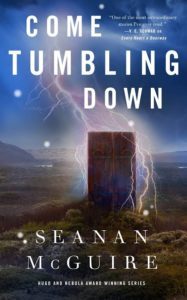 The Moors, the twin’s world they have come to love, is a place of darkness, monsters, mad science, and unforgiving fierce creatures. It is a place where gods are drowned, the moon has power, and lightning fuels the world, and it is a place where Jack feels most like herself and a home where she wants to stay. But first, Jack and friends Kade, Sumi, Cristopher, and Cora must help Jack stay sane and save this dark and macabre world. But, who knows who the monsters are? The line between good and evil or Monster and savior can be blurry. It depends entirely on which side you are standing.
The Moors, the twin’s world they have come to love, is a place of darkness, monsters, mad science, and unforgiving fierce creatures. It is a place where gods are drowned, the moon has power, and lightning fuels the world, and it is a place where Jack feels most like herself and a home where she wants to stay. But first, Jack and friends Kade, Sumi, Cristopher, and Cora must help Jack stay sane and save this dark and macabre world. But, who knows who the monsters are? The line between good and evil or Monster and savior can be blurry. It depends entirely on which side you are standing.
“The world doesn’t stop spinning because you’re sad, and that’s good; if it did, people would go around breaking hearts like they were sheets of maple sugar, just to keep the world exactly where it is. They’d make it out like it was a good thing, a few crying children in exchange for a peace that never falters or fades. We can be sad and we can be hurt and we can even be killed, but the world keeps turning, and the things we’re supposed to do keep needing to be done.”
Again, McGuire delights and intrigues with the darkly rich world she has created in the Wayward Children series. Each installment has a message or a sort of idea that can be gleaned from the pages without it coming off as preachy. In this entry, McGuire touches on the sense of self and not being at home in one’s own body. Where your body on the outside does not necessarily match who you are on the inside. It is an important message, and McGuire treats the subject delicately and with immense care.
McGuire has written another beautiful and meaningful story with Come Tumbling Down. It will delight, and maybe shock a bit. And, when you get done reading it, you might think twice about who is a monster, and who is not.
Buy Come Tumbling Down by Seanan McGuire
The post REVIEW: Come Tumbling Down by Seanan McGuire appeared first on Grimdark Magazine.
January 9, 2020
REVIEW: Blood of Elves by Andrzej Sapkowski
Blood of Elves, the first ‘proper’ book in the tale of The Witcher, is a story of extreme training, bards songs and of course, swords. You’ll want to read this and the previous two instalments before you commence your journey into Netflix’s The Witcher.
“When you know about something it stops being a nightmare. When you know how to fight something, it stops being so threatening.”
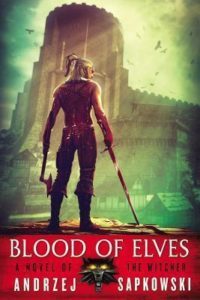 The 3rd instalment into The Witcher moves away from the prior collections of short stories, and shifts into gear for the grand arc that is sure to come in the remaining 5 instalments. Where The Last Wish and Sword of Destiny focused on monster-slaying contracts, Blood of Elves has character development at the fore. It was my main gripe with the previous two stories, how there did not seem to be an over-arching scheme that would link everything together.
The 3rd instalment into The Witcher moves away from the prior collections of short stories, and shifts into gear for the grand arc that is sure to come in the remaining 5 instalments. Where The Last Wish and Sword of Destiny focused on monster-slaying contracts, Blood of Elves has character development at the fore. It was my main gripe with the previous two stories, how there did not seem to be an over-arching scheme that would link everything together.
I highly suggest that you begin your journey into the realm of The Witcher with The Last Wish, and then Sword of Destiny as they subtly introduce a vast range of characters. I was pleasantly surprised with the return of minor characters that had quirks and personality enough for me to distinctly remember them.
“To be neutral does not mean to be indifferent or insensitive. You don’t have to kill your feelings. It’s enough to kill hatred within yourself.”
It is through Geralt’s interaction with other characters where the books come alive. The vast variety of dialogue sequences and subjects allows everyone to have their own voice, pardon the pun. Their voices and styles are distinct, if a lot of the time very wordy, which I will blame on the translation…maybe.
If you’ve played the games, you’ll notice lots of references the makers made in honour of the books. Particular scenes, such as the training of a young ‘Witcher’. There is a surprise as Geralt is not the only POV. The most notable addition is Ciri’s side of things, which I wasn’t keen on at first (everyone always wants more Geralt) but in the end really enjoyed it. She is a character that is growing on me and I am really looking forward to seeing where the story takes her.
“I know you’re almost forty, look almost thirty, think you’re just over twenty and act as though you’re barely ten.”
The world building is solid, and gives the impression of a vast and well thought out world, from the Witcher haven of Kaer Morhen to the busy city of Novigrad. Characters that drift between places are met and so are characters that are key parts of regions. I’d have loved a map to go with the various names, which would have given me a real scope of the world, but I used my knowledge of the games (which is albeit probably slightly different to how Andrej Sapkowski imagined the world).
I still managed to find the examples of a gender imbalance, which unfortunately I’ve come to expect from a Sapkowski book about the Witcher. Geralt is a good man, and someone who tries to treat everyone equally, but there were still instances in the general writing of it. Still, I was pleasantly surprised with Ciri’s POV and really enjoyed her portrayal.
Now one thing I need to say is that I was desperate for more sword and sorcery. Geralt is one of the coolest guys and he has some really cool swords and I really wanted some cool swordplay and casting of signs and monster heads to go flying and… I could go on for a while. I would have enjoyed some more action. And some more classic fairy tale re-tellings. There was certainly enough talking in Blood of Elves, there could have been a few more instances of bloody fighting and some twists and turns. Hoping I’ll get my silver sword fix in the next instalment, Time of Contempt!
“Night and day the streets resounded with music, song, and the clinking of chalices and tankards, for it is well known that nothing is such thirsty work as the acquisition of knowledge.”
3.75/5 – Hoping for something better, but still enjoying what I received. This lukewarm dish is warming up and I have high hopes for the continuation of The Witcher Saga. The preparation for Netflix’s The Witcher is enjoyable, and I am sure will sweeten the TV show and Henry Cavill’s lovely wig. More swords next time, please! Igni!
Buy Blood of Elves by Andrzej Sapkowski
The post REVIEW: Blood of Elves by Andrzej Sapkowski appeared first on Grimdark Magazine.
January 7, 2020
REVIEW: Violya by Rosalyn Kelly
With Violya, once again I am sent back to Rosalyn Kelly’s grim and brutal world, and for that, I am very happy. Set in her In the Heart of her Mountains series, Kelly’s Violya depicts the story of the titular character Violya (or V for short), the new Melokai of Peqkya. A once cautious warrior, V is thrust into a chaotic nation whereby she must repair her fractured nature, bonds, and garner new treaties with adversaries and once close allies. There is no time for hesitation, V must fight for her nation and come to terms with herself as not only the warrior she knows, but as a Melokai gifted with magical powers.
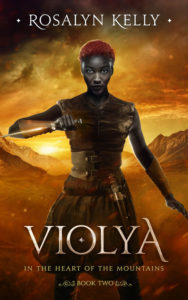 Akin to Kelly’s former novel, Violya bestows the reader with a variety of chapters from the point of view from a variety of characters such as the familiar wolf father Darrio; Queen Jessima; the Trogr (simian-like people) Gwrlain, and several more.
Akin to Kelly’s former novel, Violya bestows the reader with a variety of chapters from the point of view from a variety of characters such as the familiar wolf father Darrio; Queen Jessima; the Trogr (simian-like people) Gwrlain, and several more.
I was initially worried that I was going to get lost in the minutia of these chapters, forget names and places, but Kelly’s talent as a writer is her fantastic ability to weave interesting and intriguing elements within every chapter that she has so carefully crafted. Her world-building is phenomenal, near the level of George R.R. Martin or J.R.R. Tolkien. I could feel the sands on my cheeks as I veered into the desert kingdom of Drome and was swallowed into the dank pit of Troglo as the characters delved deep into the cavernous dominion of the unusual cave dwellers. There is a name for nearly every language, every people, every landmark, so much that I felt as if I were reading some quasi-historical text.
But what really kept me hooked was Kelly’s ability to also weave elements of myth and fairytale (perhaps knowingly or unknowingly) within her story. I’m a sucker for stories that perfectly blend the real and the unreal together, and Kelly does this with absolute precision. The Darrio chapters, for instance, examine the culture of the wolves, their fears, their desires, their deities, and the fervour they have in their new pack leader, Sarrya. It was strange and unreal, but also reminiscent of elder fables of yore and quite lovely to read in between the politicking of the other chapters.
Much like the Darrio chapters, the Gwrlain chapters were imbued with an almost macabre majesty that invoked a sense of horror and malaise. Without going so much into spoilers, there is a lovely darkness that permeates cave kingdom of Troglo, one that evokes disgust, pity, and hope in one little segment. There was just so much lore within these chapters that I felt deserved a special mention as they kept me hooked and wanting to know more and more about the plight of the Trogrs.
But much like Martin’s A Song of Ice and Fire series, and other novels/series’ that flit between character POVs, there are always ones you enjoy more. Though the Violya and Jessima chapters, for instance, are well-written and lovely, I found myself wanting more and more from the Darrio and Gwrlain segments. Other readers may fare differently, but I was so hooked to them that I found myself, at times, speedreading. A big no-no when it comes to this series. Don’t be like me. Slow down. Allow the environment to sway you into a deep meditative state of compliance and enjoy the beautiful words before your eyes.
In a similar vein, the language in the other chapters detracted from the majesty of Kelly’s world. Wolf-speak and Trogr language feels and sounds different. There is a craftsmanship there that is unseen in some of Vioyla, Jessima, Toby, and Ammad’s (though I enjoyed his chapters more so this time) chapters. They range between sounding too modern (as in copious amounts of swearing) to Arthurian clichés, not to say that it hampers the story entirely, but it certainly pulled me out at times.
My tip for slowing down, alas, also revolves around energy of this novel. To Violya’s benefit there is a stronger emphasis on action over politicking, but the action at times feels a bit too frantic. Names are constantly thrown around, people are always fighting and travelling to distant lands. I wanted to slow. Down. And. Absorb. Every. Thing.
Rosalyn Kelly’s Violya is without a doubt an interesting read. The world is rich with fantastic lore and intriguing lands. The tone is dark and provocative, insatiable at times, and gritty. Oh so gritty. Though I found the pace a bit too frantic, the novel flows well and builds upon Kelly’s In the Heart of the Mountains series wonderfully. A strong recommendation from me, especially if you’re into darker fiction.
If you’re interested, you can check out an except here.
Buy Violya by Rosalyn Kelly
The post REVIEW: Violya by Rosalyn Kelly appeared first on Grimdark Magazine.
January 4, 2020
REVIEW: The Red Knight by Miles Cameron
The Red Knight was the first fantasy book I have read (listened to) by author Miles Cameron. I had read his entire Chivalry series (one of my favourite series), which is some of his historical work under the name Christian Cameron. There are similarities between Chivalry and The Red Knight, being set in a late medieval land filled with awesome sword fights, epic battles, a vast display of medieval knowledge and authentic grit.
“Listen up, then. Evil is a choice. It is a choice. Doing the wicked thing is the easy way out, and it is habit forming. I’ve done it.”
But…
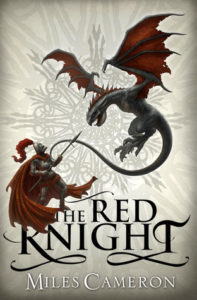 The Red Knight has Wyverns. And Boglins. And Irks and many other forms of creatures part of the ‘Wyld’. Although it has a feel similar to his medieval writing, it also had it’s own completely fantastical feel, with added world-building that displays hours and hours of thought and planning into. The world The Red Knight is based is ripe with life, mercenary companies, foreign knights, courtly competition and a convent of nuns.
The Red Knight has Wyverns. And Boglins. And Irks and many other forms of creatures part of the ‘Wyld’. Although it has a feel similar to his medieval writing, it also had it’s own completely fantastical feel, with added world-building that displays hours and hours of thought and planning into. The world The Red Knight is based is ripe with life, mercenary companies, foreign knights, courtly competition and a convent of nuns.
“To the captain, piety came in three brands—false piety, hypocritical piety, and hard won, deep and genuine piety. He fancied that he could tell them apart.”
The book begins with a fast pace and it carried that on for over 600 pages (30 hours of audible). Though, through all of the action set-pieces, battles, confrontations and duels there are plenty of opportunities to get to know each character and voice. This book has multiple POVs, some used more than others and it does take a little bit of time to adjust to the style. But from the first meeting with The Captain, I felt hooked.
The description of medieval inspired villages and lives is fantastic. Miles Cameron definitely brings his experience of re-enactment with him to make the reader understand the clothing of the period, weapon details, horse-riding and what it really feels to be in a battle. It is in these moments that the characters show thier uniqueness, and through that display Cameron’s character’s developments.
“His sword took the nearest neatly, because killing fleeing infantryman was an essential part of knightly training, taken for granted, like courage.”
The Captain is a fantastic character, full of humour and humility as well as martial prowess that I personally love to read about. Members of his company standout, like Bad Tom and Sauce, and I really enjoyed Michael’s parts. They all had moments of joy, sadness, anger and blood-lust. They all felt real. There were characters I could empathise with, and character’s I grew to detest, not mentioning any names… certainly no French knights…No.
5/5 – I cannot recommend this book enough. If you take a while to adjust to the multiple POVs at the beginning, then keep going, You won’t regret it. I look forward to delving deeper into the Traitor Son Cycle. Read it!
Buy The Red Knight by Miles Cameron
The post REVIEW: The Red Knight by Miles Cameron appeared first on Grimdark Magazine.
January 3, 2020
REVIEW: The Millennial Manifesto by Michael R. Fletcher
The Millennial Manifesto is a sparse, in-your-face story about the duality of politics and perspectives. If you love Quentin Tarantino movies, with a dose of stark commentary on current events, you will love this story.
“The Brave? People cowered in their homes, clutching their guns, living in fear of their neighbors and the very government they voted into power: land of the scared, home of the wage slaves.”
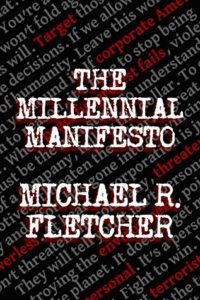 The premise is simple. You have two groups and two wildly different perspectives. Julia, Chen, Aarush, and Inanna are friends with a singular purpose — they want to change the world. They want to fix the crushing reality of being a millennial and living in a generation whose lives will be worse than those preceding it, and they will do anything to accomplish this task.
The premise is simple. You have two groups and two wildly different perspectives. Julia, Chen, Aarush, and Inanna are friends with a singular purpose — they want to change the world. They want to fix the crushing reality of being a millennial and living in a generation whose lives will be worse than those preceding it, and they will do anything to accomplish this task.
Right away, you can see the morally gray area of this sentiment.
The other group is Hiran, Chuck, and Fana. Hiran and Chuck are soldiers — thugs for hire. While Fana is a hacker and assists them by finding their targets and at accessing stores of protected information, they already exist on the far side of questionable morals. The cool thing about how this story is that it has dueling protagonists. Each chapter switches back and forth between the perspectives of Hiran and Inanna. This allows the reader to see how morally ambiguous some actions of either character can be. Who “good guys” are and who the “bad guys” are is not always straightforward. Just as it is in life, people are usually neither good nor bad, and in the end, no one thinks of themselves as the bad guy.
With Hiran, although he is a mercenary, he is a father and husband. He worries about his joints and paying for his daughter’s college education. He is hired to do dirty work by a capitalist and all-around horrible person, Gartner. Gartner is also the target for Innana’s terrorist group’s first action. Innana is a woman who is anchorless. She has come into money after the death of her parents and wants to do something better with her life and for the world.
“Part of her wanted that, to go back to her easy life, to putter about pointless hobbies. No. I am going to make the world a better place. “Do any of you want out?” she asked.”
She does this by funding a small nameless terrorist cell. After the Innana’s group completes their first terrorist like action, they make Gartner drink dirty water from one of the streams he has ruined through pollution; they have to go on the run after the second group starts to chase them. From there, the story evolves into chases of cat and mouse. Each group displays actions that both humanize and demonize them.
It is an exciting take on this type of story and one that Fletcher has done it well. It is quite a departure from the science fiction and fantasy story that we have become accustomed to from him.
It is a great story.
Engaging and visceral, the reader gets drawn into the minds of the two protagonists right away. You want to know how it is going end, and from the get-go, the reader has no idea how the story will play out. My only small qualm with the story is that I didn’t feel like it was long enough. I wanted more from the characters; I wanted a more substantial base to pull from before the characters started to go on the run. The story also ends very abruptly. Whether that is a stylistic choice by the author, as it fits the narrative style, or just how the story played out, I am not sure. But it is a good ride either way.
If you are a fan of Tarantino type story that is ruthless with its characters, The Millennial Manifesto is the right choice. I hope that Fletcher continues the tale because there is room in this world for another story arc or five.
Buy The Millennial Manifesto by Michael R. Fletcher
The post REVIEW: The Millennial Manifesto by Michael R. Fletcher appeared first on Grimdark Magazine.
December 31, 2019
Our Hopes for Elden Ring
Just before E3 2019, rumors spread of a collaboration between two Grimdark giants: FromSoftware helmed by Hidetaka Miyazaki known worldwide for their Dark Souls trilogy of games and their dark, gritty, “git gud” gameplay working hand in hand with one of the lords of Grimdark literature George R.R. Martin. When Elden Ring was announced during E3 the room erupted with cheer for the chance to play through a story crafted by a legend and a world honed by skilled artisans of gaming. This most unholy of unions could be the best combination in gaming since CD Projekt Red brought the world of The Witcher to life. Here are my hopes for Elden Ring.
A New Generation of Graphical Prowess
Like most of its older siblings Elden Ring will allow us to create our own characters to roam the world of GRRM’s mythos and Miyazaki’s skillful craftsmanship (we know full well there will be countless wonderful armor sets people will be dying to cosplay). The one thing that was always lacking to me was the level of detail in the actual player characters features. I’m hoping the quality of characters we received in Sekiro: Shadows Die Twice, specifically the Wolf brought to the player character of Elden Ring. Having higher quality textures and more detail will also go a long way for a game of this caliber. Depending on the style or armor—no matter if it’s the heavy armor of Dark Souls or the Victorian inspired Long coats of Bloodborne—having more detailed facial animations and features would be a blessing. I would love to be able to see the fear in my character’s eyes as they are outnumbered only for it to change to the biggest shit eating grin as I cleave heads in half.
A Gritty Narrative with Good Company
Miyazaki stated in an interview that during the early development of Elden Ring he collaborated with GRRM on themes and ideas for the project in which George then went and created the mythos. This left Miyazaki to interpret the works GRRM provided acted like a good DM in a tabletop RPG with all the handbooks. Miyazaki had to then shape the world visually and create the main scenario on his own as if it were a Dungeons & Dragons campaign. I hope this will lead to something I always found Dark Souls lacked being more prominent, characters development. There are many characters in the Soulsborne games who are interesting Artorias and Sif, Gwyn the Lord of Cinder, Father Gascoigne, Lady Maria and The Doll to name a few. But overall the characters feel one dimensional and vague as their stories are spread thin and can be easily missed while playing. This is something GRRM can remedy. Who doesn’t love the wit and wisdom of Tyrion Lannister who is often said to be the character GRRM spends the most time rewriting to get perfect. I would love to see the NPCs of Elden Ring brought to life and treated with more care in their crafting. Miyazaki had a habit of hiding the lore of the world and characters behind item flavor text. It was unique at first but having to hunt for stories through small and vague remarks in the games items menu is not nearly as fun as experiencing it as you play. Getting to live out the story as the adventure unfolds would bring so much more life into the game.
A Realm Bathed in Blood to Explore
Traversing Westeros and Essos in HBO’s Game of Thrones was stunning but the novels themselves left your own imagination in charge of adding the details to the world beyond the basics which GRRM provided. If Miyazaki gives the mythos GRRM created for Elden Ring the same treatment he gave the Soulsborne games I cannot wait to see what is to come. FromSoftware thrives at providing richly detailed worlds like the beautiful castles of Anor Londo and the dilapidated city of Lothric, or the sweeping Gothic and Victorian inspired streets of Old Yharnum let alone the breathtaking Japanese countryside in Sekiro. They design their worlds for you to be able to explore every crevice to fully unravel the mysteries of the world they lay before you. With Elden Ring bringing more of an open world than its predecessors I for one cannot wait to scour every centimeter will be awe inspiring sights.

(Lothric Dark Souls 3)
Dodge-roll your way to Victory
The term “git gud” has become synonymous with the brutally difficult gameplay of Dark Souls and it is one thing we can be entirely sure will remain in Elden Ring. The difference however will be in the way they work their combat system for their newest title. As I am readying myself for the beat downs to come I question what sort of combat they will give us. They have already said horseback combat will be in the game which is new, but how will the standard combat be? What I am hoping for is an amalgamation of their previous combat systems into a truly dynamic experience where you can utilize any number of different weapons from the intricate form altering weapons and firearms of Bloodborne to the standard swords and sorcery of Dark Souls. Adding in the stealth mechanics from Sekiro along with its grappling hook and you can make the quintessential game for player to choose how they wish to get their arses served to them. I would love to be able to dodge-roll around filling a creature full of lead in between each roll until the time is right to throw a grappling hook into its skull and pull it into my rapier’s blade.
Waiting out the Clock
Elden Ring is still a long ways away from being finished. A release date is still to be announced but the hype FromSoftware generated at E3 will hopefully continue to boil as they release more and more details in the coming months until we finally have the game in our hands, be it physically on console or digitally for PC. I know I am looking forward to seeing if my hopes and expectations can be met, when the time finally arrives. Let me know your hopes for Elden Ring in the comments below.
The post Our Hopes for Elden Ring appeared first on Grimdark Magazine.
December 29, 2019
SFF in 2020: What we can’t wait to read in the new decade
SFF in 2020 is something we’re all very much looking forward to. There’s plenty of goodness on the horizon, and in lieu of the release date of Joe Abercrombie’s The Trouble with Peace, our team has each come up with their most looked-forward-to read of 2020. Tell those TBR piles that pain is a’coming!
The Shadow Saint by Gareth Ryder-Hanrahan
Holly Adams SFF in 2020
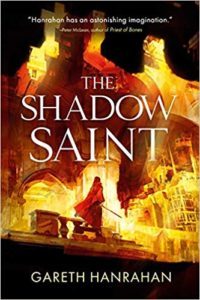 I’m really looking forward to The Shadow Saint by Gareth Hanrahan! The Gutter Prayer was brilliantly original & so fucking bonkers! I loved it!
I’m really looking forward to The Shadow Saint by Gareth Hanrahan! The Gutter Prayer was brilliantly original & so fucking bonkers! I loved it!
Blurb: Thieves, dangerous magic, and a weapon built with the power to destroy a god clash in this second novel of Gareth Hanrahan’s acclaimed epic fantasy series, The Black Iron Legacy.
Enter a city of spires and shadows . . .
The Gutter Miracle changed the landscape of Guerdon forever. Six months after it was conjured into being, the labyrinthine New City has become a haven for criminals and refugees.
Rumors have spread of a devastating new weapon buried beneath the streets – a weapon with the power to destroy a god. As Guerdon strives to remain neutral, two of the most powerful factions in the godswar send agents into the city to find it.
As tensions escalate and armies gather at the borders, how long will Guerdon be able to keep its enemies at bay?
The Shadow Saint continues the gripping tale of dark gods and dangerous magic that began with Hanrahan’s acclaimed debut The Gutter Prayer.
The Thorn of Emberlain by Scott Lynch
Elizabeth Tabler SFF in 2020
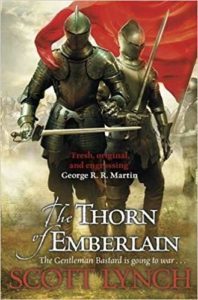 The book I am most looking forward to reading in 2020 is The Thorn of Emberlain from The Gentleman Bastards. I love this series and the twisty plot and snark. I do enjoy a bit of wit and snark in fantasy stories and this series has it in spades.
The book I am most looking forward to reading in 2020 is The Thorn of Emberlain from The Gentleman Bastards. I love this series and the twisty plot and snark. I do enjoy a bit of wit and snark in fantasy stories and this series has it in spades.
Blurb: With 50,000 copies sold of The Republic of Thieves and with praise from the likes of Joe Abercrombie and George RR Martin the saga of the Gentleman Bastard has become a favourite and key part of the fantasy landscape. And now Locke Lamora, thief, con-man, pirate, political deceiver must become a soldier. A new chapter for Locke and Jean and finally the war that has been brewing in the Kingdom of the Marrows flares up and threatens to capture all in its flames. And all the while Locke must try to deal with the disturbing rumours about his past revealed in The Republic of Thieves. Fighting a war when you don’t know the truth of right and wrong is one thing. Fighting a war when you don’t know the truth of yourself is quite another. Particularly when you’ve never been that good with a sword anyway…
The Girl and the Stars by Mark Lawrence
Chris Haught SFF in 2020
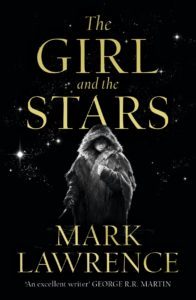 The next series begins in the world of The Book of the Ancestor, which is a trilogy I completely fell in love with. Surely it will live up to the high standards of storytelling that Lawrence is known for.
The next series begins in the world of The Book of the Ancestor, which is a trilogy I completely fell in love with. Surely it will live up to the high standards of storytelling that Lawrence is known for.
Blurb: A stunning new epic fantasy series following a young outcast who must fight with everything she has to survive, set in the same world as Red Sister.
In the ice, east of the Black Rock, there is a hole into which broken children are thrown. Yaz’s people call it the Pit of the Missing and now it is drawing her in as she has always known it would.
To resist the cold, to endure the months of night when even the air itself begins to freeze, requires a special breed. Variation is dangerous, difference is fatal. And Yaz is not the same.
Yaz’s difference tears her from the only life she’s ever known, away from her family, from the boy she thought she would spend her days with, and has to carve out a new path for herself in a world whose existence she never suspected. A world full of difference and mystery and danger.
Yaz learns that Abeth is older and stranger than she had ever imagined. She learns that her weaknesses are another kind of strength and that the cruel arithmetic of survival that has always governed her people can be challenged.
Idols Fall by Mike Shel
Nate Aubin SFF in 2020
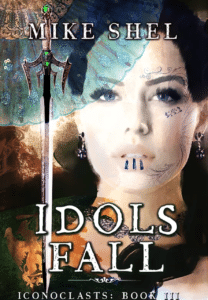 After the shattering revelations and superbly dark worldbuilding of Sin Eater, I’m dying to get my hands on the trilogy’s last volume. Iconoclasts is a series that deftly mixes high fantasy adventuring tropes with horror, dread, and gritty realism and features some of my favorite fictional characters to date. I’m pleasantly nervous to see what terrors and traumas Shel has in store come 2020.
After the shattering revelations and superbly dark worldbuilding of Sin Eater, I’m dying to get my hands on the trilogy’s last volume. Iconoclasts is a series that deftly mixes high fantasy adventuring tropes with horror, dread, and gritty realism and features some of my favorite fictional characters to date. I’m pleasantly nervous to see what terrors and traumas Shel has in store come 2020.
Blurb:
Sequel to Sin Eater and conclusion to the Iconoclasts series.
Scheduled for a 2020 release.
(Actual cover not pictured; taken from the author’s website)
Pre-order not available as of this post
Out of Body by Jeffrey Ford
Mike Myers SFF in 2020
 The novel I am most looking forward to for 2020 is (probably) Out of Body by Jeffrey Ford. Ford is a multi-award-winning monster of a writer. This past year I reread his mind-blowing fantasy trilogy The Well-Built City, the first book of which, The Physiognomy, won the World Fantasy Award. Out of Body is purported to be a contemporary urban dark fantasy thriller, but you can also expect, since it’s Jeffrey Ford, that it will be a work of literary genius. It is scheduled for release by Tor.com in May of 2020 as part of their superb novella series.
The novel I am most looking forward to for 2020 is (probably) Out of Body by Jeffrey Ford. Ford is a multi-award-winning monster of a writer. This past year I reread his mind-blowing fantasy trilogy The Well-Built City, the first book of which, The Physiognomy, won the World Fantasy Award. Out of Body is purported to be a contemporary urban dark fantasy thriller, but you can also expect, since it’s Jeffrey Ford, that it will be a work of literary genius. It is scheduled for release by Tor.com in May of 2020 as part of their superb novella series.
Blurb: A small-town librarian witnesses a murder at his local deli, and what had been routine sleep paralysis begins to transform into something far more disturbing. The trauma of holding a dying girl in his arms drives him out of his own body. The town he knows so well is suddenly revealed to him from a whole new perspective. Secrets are everywhere and demons fester behind closed doors.
Worst of all, he discovers a serial killer who has been preying on the area for over a century, one capable of traveling with him through his dreams.
The Unspoken Name by A. K. Larkwood
James Tivendale SFF in 2020
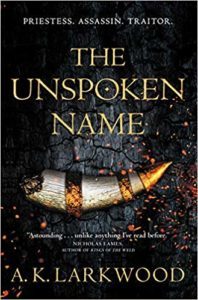 I received a copy of Larkwood’s upcoming dark fantasy debut a few months ago from TOR and it has risen rapidly towards the top of my to-be-read list. The marketing blurb reads as “worlds collide in this epic new series, perfect for fans of Joe Abercrombie and Robin Hobb.” A sorcerer wants a young lady as his assistant, sword-hand and assassin. The early Goodreads ratings are looking great with an average of 4.5/5 from 72 reviews and genre tags including “fantasy”, “LGBT”, and “adult”. I’m very excited for this one.
I received a copy of Larkwood’s upcoming dark fantasy debut a few months ago from TOR and it has risen rapidly towards the top of my to-be-read list. The marketing blurb reads as “worlds collide in this epic new series, perfect for fans of Joe Abercrombie and Robin Hobb.” A sorcerer wants a young lady as his assistant, sword-hand and assassin. The early Goodreads ratings are looking great with an average of 4.5/5 from 72 reviews and genre tags including “fantasy”, “LGBT”, and “adult”. I’m very excited for this one.
Blurb: What if you knew how and when you will die?
Csorwe does―she will climb the mountain, enter the Shrine of the Unspoken, and gain the most honored title: sacrifice.
But on the day of her foretold death, a powerful mage offers her a new fate. Leave with him, and live. Turn away from her destiny and her god to become a thief, a spy, an assassin―the wizard’s loyal sword. Topple an empire, and help him reclaim his seat of power.
But Csorwe will soon learn―gods remember, and if you live long enough, all debts come due.
Neon Leviathan by T.R. Napper
Adrian Collins SFF in 2020
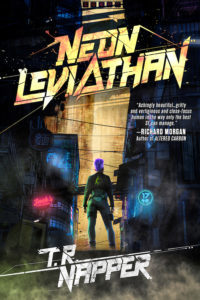 I am just so excited to see this book on the stands, come Feb 15 2020. It’s been a collection years in the making, and is on point for people who love Altered Carbon and similar books–in fact it’s blurbed by Richard Morgan and features a forward by Adrian Tchaikovsky. It’s grim and gritty AF, brilliantly written by an award-winning author, and we can’t wait to release it to you all.
I am just so excited to see this book on the stands, come Feb 15 2020. It’s been a collection years in the making, and is on point for people who love Altered Carbon and similar books–in fact it’s blurbed by Richard Morgan and features a forward by Adrian Tchaikovsky. It’s grim and gritty AF, brilliantly written by an award-winning author, and we can’t wait to release it to you all.
Blurb: A collection of stories about the outsiders – the criminals, the soldiers, the addicts, the mathematicians, the gamblers and the cage fighters, the refugees and the rebels. From the battlefield, to alternate realities, to the mean streets of the dark city, we walk in the shoes of those who struggle to survive in a neon-saturated, tech-noir future.
Twelve hard-edged stories from the dark, often violent, sometimes strange heart of cyberpunk, this collection – as with all the best science fiction – is an exploration of who were are now. In the tradition of Dashiell Hammett, Philip K Dick, and David Mitchell, Neon Leviathan is a remarkable debut collection from a breakout new author.
After an epic 2019 (read out best of list here) there is plenty to love on the SFF in 2020 horizon. As fans of SFF I bet you’re all keen as mustard to buy way more books than you can possible read, urge your mates to try out the books you’ve enjoyed, and see as many as possible being turned into Netflix or Amazon Prime specials as possible.
The post SFF in 2020: What we can’t wait to read in the new decade appeared first on Grimdark Magazine.


